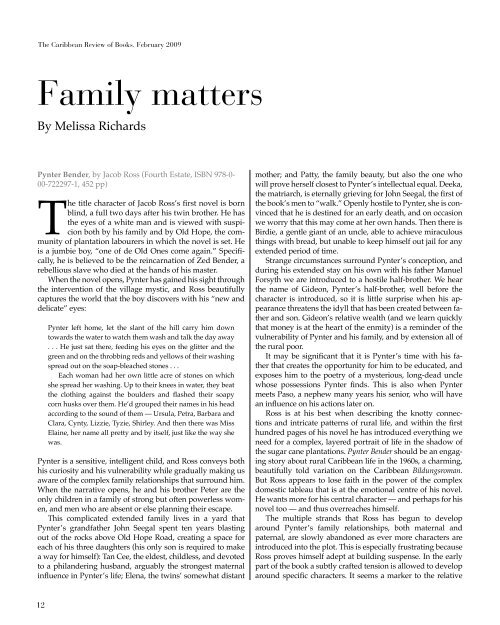The Caribbean Review of Books (New vol. 1, no. 19, February 2009)
A sample of the new CRB, as published by MEP until 2009
A sample of the new CRB, as published by MEP until 2009
You also want an ePaper? Increase the reach of your titles
YUMPU automatically turns print PDFs into web optimized ePapers that Google loves.
<strong>The</strong> <strong>Caribbean</strong> <strong>Review</strong> <strong>of</strong> <strong>Books</strong>, <strong>February</strong> <strong>2009</strong><br />
Family matters<br />
By Melissa Richards<br />
Pynter Bender, by Jacob Ross (Fourth Estate, ISBN 978-0-<br />
00-722297-1, 452 pp)<br />
<strong>The</strong> title character <strong>of</strong> Jacob Ross’s first <strong>no</strong>vel is born<br />
blind, a full two days after his twin brother. He has<br />
the eyes <strong>of</strong> a white man and is viewed with suspicion<br />
both by his family and by Old Hope, the community<br />
<strong>of</strong> plantation labourers in which the <strong>no</strong>vel is set. He<br />
is a jumbie boy, “one <strong>of</strong> de Old Ones come again.” Specifically,<br />
he is believed to be the reincarnation <strong>of</strong> Zed Bender, a<br />
rebellious slave who died at the hands <strong>of</strong> his master.<br />
When the <strong>no</strong>vel opens, Pynter has gained his sight through<br />
the intervention <strong>of</strong> the village mystic, and Ross beautifully<br />
captures the world that the boy discovers with his “new and<br />
delicate” eyes:<br />
Pynter left home, let the slant <strong>of</strong> the hill carry him down<br />
towards the water to watch them wash and talk the day away<br />
. . . He just sat there, feeding his eyes on the glitter and the<br />
green and on the throbbing reds and yellows <strong>of</strong> their washing<br />
spread out on the soap-bleached stones . . .<br />
Each woman had her own little acre <strong>of</strong> stones on which<br />
she spread her washing. Up to their knees in water, they beat<br />
the clothing against the boulders and flashed their soapy<br />
corn husks over them. He’d grouped their names in his head<br />
according to the sound <strong>of</strong> them — Ursula, Petra, Barbara and<br />
Clara, Cynty, Lizzie, Tyzie, Shirley. And then there was Miss<br />
Elaine, her name all pretty and by itself, just like the way she<br />
was.<br />
Pynter is a sensitive, intelligent child, and Ross conveys both<br />
his curiosity and his vulnerability while gradually making us<br />
aware <strong>of</strong> the complex family relationships that surround him.<br />
When the narrative opens, he and his brother Peter are the<br />
only children in a family <strong>of</strong> strong but <strong>of</strong>ten powerless women,<br />
and men who are absent or else planning their escape.<br />
This complicated extended family lives in a yard that<br />
Pynter’s grandfather John Seegal spent ten years blasting<br />
out <strong>of</strong> the rocks above Old Hope Road, creating a space for<br />
each <strong>of</strong> his three daughters (his only son is required to make<br />
a way for himself): Tan Cee, the eldest, childless, and devoted<br />
to a philandering husband, arguably the strongest maternal<br />
influence in Pynter’s life; Elena, the twins’ somewhat distant<br />
mother; and Patty, the family beauty, but also the one who<br />
will prove herself closest to Pynter’s intellectual equal. Deeka,<br />
the matriarch, is eternally grieving for John Seegal, the first <strong>of</strong><br />
the book’s men to “walk.” Openly hostile to Pynter, she is convinced<br />
that he is destined for an early death, and on occasion<br />
we worry that this may come at her own hands. <strong>The</strong>n there is<br />
Birdie, a gentle giant <strong>of</strong> an uncle, able to achieve miraculous<br />
things with bread, but unable to keep himself out jail for any<br />
extended period <strong>of</strong> time.<br />
Strange circumstances surround Pynter’s conception, and<br />
during his extended stay on his own with his father Manuel<br />
Forsyth we are introduced to a hostile half-brother. We hear<br />
the name <strong>of</strong> Gideon, Pynter’s half-brother, well before the<br />
character is introduced, so it is little surprise when his appearance<br />
threatens the idyll that has been created between father<br />
and son. Gideon’s relative wealth (and we learn quickly<br />
that money is at the heart <strong>of</strong> the enmity) is a reminder <strong>of</strong> the<br />
vulnerability <strong>of</strong> Pynter and his family, and by extension all <strong>of</strong><br />
the rural poor.<br />
It may be significant that it is Pynter’s time with his father<br />
that creates the opportunity for him to be educated, and<br />
exposes him to the poetry <strong>of</strong> a mysterious, long-dead uncle<br />
whose possessions Pynter finds. This is also when Pynter<br />
meets Paso, a nephew many years his senior, who will have<br />
an influence on his actions later on.<br />
Ross is at his best when describing the k<strong>no</strong>tty connections<br />
and intricate patterns <strong>of</strong> rural life, and within the first<br />
hundred pages <strong>of</strong> his <strong>no</strong>vel he has introduced everything we<br />
need for a complex, layered portrait <strong>of</strong> life in the shadow <strong>of</strong><br />
the sugar cane plantations. Pynter Bender should be an engaging<br />
story about rural <strong>Caribbean</strong> life in the <strong>19</strong>60s, a charming,<br />
beautifully told variation on the <strong>Caribbean</strong> Bildungsroman.<br />
But Ross appears to lose faith in the power <strong>of</strong> the complex<br />
domestic tableau that is at the emotional centre <strong>of</strong> his <strong>no</strong>vel.<br />
He wants more for his central character — and perhaps for his<br />
<strong>no</strong>vel too — and thus overreaches himself.<br />
<strong>The</strong> multiple strands that Ross has begun to develop<br />
around Pynter’s family relationships, both maternal and<br />
paternal, are slowly abandoned as ever more characters are<br />
introduced into the plot. This is especially frustrating because<br />
Ross proves himself adept at building suspense. In the early<br />
part <strong>of</strong> the book a subtly crafted tension is allowed to develop<br />
around specific characters. It seems a marker to the relative<br />
12


















